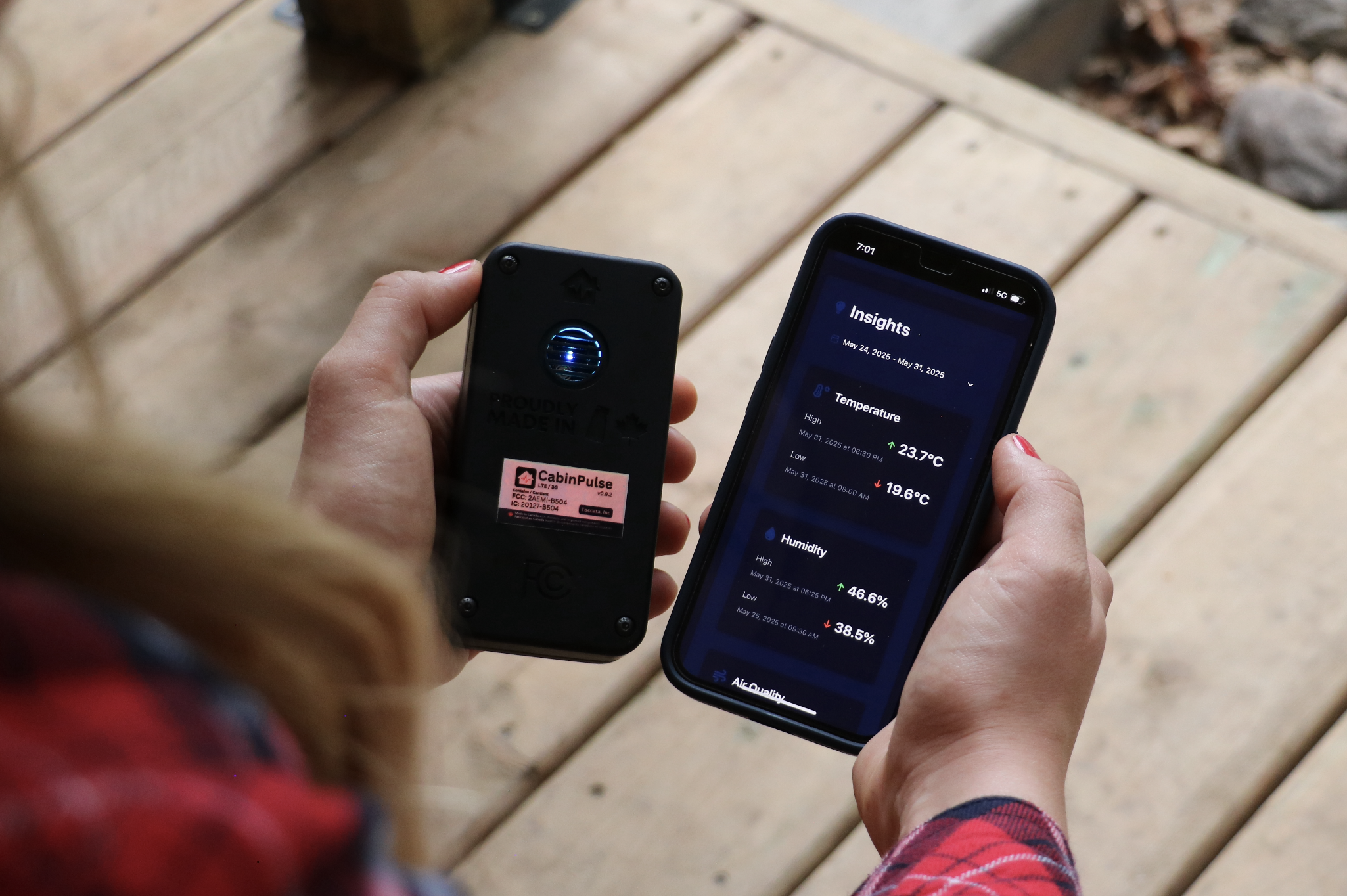If you've owned a cottage for more than a season, you've probably experienced it - that moment when the hum of the fridge suddenly stops, the lights flicker and die, and you're left standing in the quiet darkness wondering how long this one's going to last.
Or scarier still, arriving to find flashing clocks and not knowing when or how long power was out for since your last visit,
Power outages at the cottage are almost as Canadian as mosquitoes are. But while city dwellers might see their power restored within seconds, cottage country plays by different rules.
And those rules can turn a minor inconvenience into a major headache – or worse, a costly disaster.
Why Your Cottage Loses Power More Than Your City Home
It's not your imagination – cottages really do experience more power outages than urban homes. Rural customers in Canada experience outages roughly three times more frequently than their urban counterparts. While your city friends might deal with one or two outages a year, you're probably resetting clocks every time you arrive.

The reasons are pretty straightforward when you think about it. Power has to travel much farther to reach your cabin than it does to reach a downtown condo. Those extra kilometres of wire strung through forests and across fields mean thousands more opportunities for something to go wrong.
The Perfect Storm of Challenges
Distance and Exposure: Rural power lines face the full fury of Canadian weather. While city lines get some protection from buildings, your cottage's power supply stands naked against ice storms that coat lines with crushing weight, winds that build speed across open water before slamming into infrastructure, and those beautiful trees we all love – until they're growing into the power lines.
Wildlife Encounters: Here's something city folks don't deal with: squirrels, raccoons, birds of prey, and even the occasional bear can interfere with rural power equipment. That adorable family of raccoons might be less cute when they cause a transformer to blow.
The Economics: In the city, one transformer might serve dozens of apartments. In cottage country, that same transformer might serve just three or four properties spread across several kilometres. When repairs are needed, there are simply fewer customers to share the cost, making upgrades happen less frequently.
Help is Far Away: When your cottage loses power, repair crews might need to drive for an hour just to reach the general area, then spend additional time locating the specific problem along kilometres of rural line. And with fewer crews stationed in rural areas, you're often waiting for help to arrive from the nearest town.
When the Power Goes Out, the Problems Pile Up
A power outage at the cottage isn't just about reading by candlelight (though that can be romantic). It's the cascade of problems that follow, especially when you're not there to manage them.

The Fridge and Freezer Fiasco
Remember that beautiful lake trout you caught and froze for Thanksgiving? Or the steaks you bought for next weekend's visit? After 24-48 hours without power, you'll be returning to a smell that'll have you reaching for the bleach.
One cottage owner from Manitoba told me about returning after a week-long outage to find their freezer had become "a horror movie prop." The cleanup took days, and the smell lingered for weeks. "We had to throw out the freezer entirely," she said. "The smell just wouldn't leave."
Winter's Frozen Pipe Nightmare
This is the big one – the disaster that keeps cottage owners awake at night in January. When the power fails, so does your heating system. In Canadian winters, it doesn't take long for indoor temperatures to plummet. Once they hit freezing, your pipes become ice-filled time bombs.

The math is sobering: a single burst pipe can cause around $16,000 in damage. And here's the kicker – it might be days or weeks before you discover the disaster. One Muskoka cottage owner discovered their burst pipe had been spraying water for two weeks. "It was like walking into an ice palace," he recalled.
"Beautiful, but devastating."
The Pump Problem
If you're on well water, a power outage means no water. Your pump needs electricity to bring water up from the well. No power means no showers, no toilet flushing, no drinking water.
Sump pumps face the same fate. That pump keeping your basement dry during spring melt or heavy rains? It's now just expensive decoration. A weekend storm that knocks out power could leave you returning to a flooded basement.
When Smart Homes Go Dumb
Here's a modern irony: all those smart home devices you installed for peace of mind become useless exactly when you need them most. Your WiFi router needs power. Your smart thermostat can't send you alerts without internet. Your security cameras go dark. Your smart water leak detectors fall silent.

One cottage owner learned this the hard way:
I had a whole smart home setup – cameras, thermostat, leak detectors, the works. Then a winter storm knocked out power for four days. I was blind to everything happening at the cottage. By the time power was restored, the damage was done.
Protecting Your Cottage Paradise
So what's a cottage owner to do? You can't prevent every power outage, but you can certainly minimize the damage.
Traditional Solutions
Generators: A good generator can keep essential systems running – your heating, fridge, and sump pump. Automatic standby generators kick in within seconds of an outage. Portable generators are cheaper but require someone to be there to start them.
Winterization: If you're not using the cottage in winter, proper shut-down procedures are crucial. Drain the pipes, shut off the water, and add antifreeze to traps. No water in the pipes means no burst pipes, even if the temperature drops to -40°C.
Good Neighbours: The cottage community is famous for looking out for each other. Exchange numbers with year-round neighbours who can check on your place after storms.
Power Outage Monitors
Technology has come a long way in helping cottage owners sleep better at night. Smart grid equipment helps utilities identify and isolate problems more quickly.
But you don't have to wait for utility upgrades.

New cellular-based monitoring systems work even when the power and internet are out. These devices use backup batteries and cellular networks (like a phone) to keep you informed about temperature, power status, and other critical conditions at your cottage. If the power fails and temperature starts dropping toward the danger zone, you'll get an alert on your phone – giving you time to arrange help before those pipes freeze.
The best part? They don't rely on your cottage's WiFi, so they keep working when everything else fails.
CabinPulse is a great example of a power outage monitor - and it's made in Canada!
Create Your Outage Action Plan
Every cottage should have a power outage plan:
- Know your shut-offs: Make sure everyone knows where the main water shut-off is located
- Emergency supplies: Keep flashlights, batteries, and a battery-powered radio at the cottage
- Contact list: Have numbers for neighbors, local handypeople, and your power utility
- Winter preparations: Consider installing a low-temperature alarm like CabinPulse that can send you alerts
- Document everything: Take photos for insurance if damage occurs
Making Peace with the Inevitable
Power outages at the cottage are like taxes and blackflies – inevitable parts of the experience. But with preparation, monitoring, and a good sense of humor, they don't have to ruin your cottage dreams.
After all, some of my best cabin memories happened during power outages – board games by candlelight, stories around the woodstove, and stars so bright they took your breath away because there wasn't a powered light for miles.
The trick is making sure that when the lights come back on, your cottage is still the paradise you left it as. Because while a weekend without power can create memories, coming back to burst pipes and spoiled food creates the wrong kind of memories entirely.

So check those flashlight batteries, consider your monitoring options, and maybe introduce yourself to that year-round neighbour you've been meaning to meet.
When the next outage hits – and it will – you'll be ready.






Join the Conversation